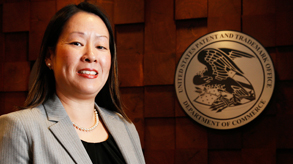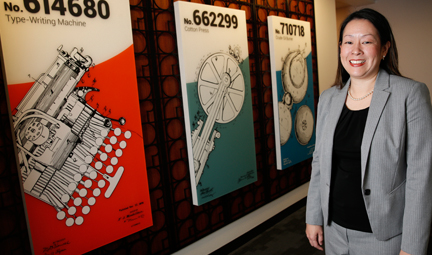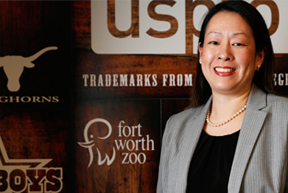© 2015 The Texas Lawbook.
By Jeff Bounds
(Jan. 4) – Growing up in the Texas community of Clear Lake, about 15 minutes away from Space Center Houston, Hope Shimabuku was all about astronauts.
Her mother had worked as a programmer on the Apollo program for the National Aeronautics and Space Administration.
And in the 1980s, space shuttles that were returning to earth would circle in the sky above her elementary school. The young Shimabuku and other students would stand in the back yard of the school to wave as the vehicles would descend to earth.
“I just thought that was the coolest thing,” she said. “I thought all kids had astronauts visiting their school.”
On Monday, Jan. 4, Shimabuku will begin her own journey to go where no man has gone before – or anybody else, for that matter. It will be her first day on the job as the initial director of the new Dallas office of the United States Patent and Trademark Office.
 She will be sworn in at the USPTO’s headquarters in Alexandria, Va. on Monday. Her first day in Dallas is slated for Thursday, Jan. 7.
She will be sworn in at the USPTO’s headquarters in Alexandria, Va. on Monday. Her first day in Dallas is slated for Thursday, Jan. 7.
Although Shimabuku is widely known and liked among North Texas intellectual property lawyers, she will take the helm in Dallas for an agency that has struggled to cope in recent years with the ongoing growth of applications from individuals and companies seeking legal protection of their ideas.
The issue is most pronounced in patents, which are essentially temporary legal monopolies on inventions, be those better mousetraps or the latest technologies for cell phones.
“The patent office was facing a backlog of over 550,000 unexamined patent applications as of October 2015,” said Nate St. Clair, a partner in the Dallas office of Jackson Walker. “The Dallas office will need to maintain the proper talent to assist in fielding and processing the backlog of applications.”
Another task on Shimabuku’s to-do list will be setting the work culture of the office, St. Clair noted.
“As certain areas of the USPTO have previously suffered from low morale, it will be important for the new director to provide a roadmap on how this office will continue to streamline the patent examining process for patentees and provide a great work environment for the core (examiners) in Dallas,” he said.
To be sure, the Alexandria, Va.-based agency has made progress in recent years, both in reducing its backlog of patent applications and in improving morale.
For instance, its pile of unexamined patent applications shrank 8.7 percent this past fiscal year, a recent report noted. And a non-profit recently ranked the USPTO No. 13 in a “best places to work” survey of 320 subcomponent agencies in the federal government.
Still, Shimabuku acknowledges that she will have a lot on her plate, especially as she tries to build what amounts to a start-up organization in Dallas into an important player in the intellectual-property scene in the eight states that the office serves.
But those who know her believe she is more than up to the challenge.
“She is fearless and dedicated in her work. She is also a great people person and knows how to pull a team together,” said Stacey Cho, an associate attorney in labor and employment litigation at Carter Scholer Arnett Hamada & Mockler in Dallas.
Shimabuku has served as a mentor to Cho, as both graduated in the last decade from the Dedman School of Law at Southern Methodist University.
“She finds ways to be a dedicated contributor to the Dallas bar, the Asian bar, and the female bar,” Cho added. “She is an all-around rock star.”
Teaching the Professor
Shimabuku comes from a family that has excelled in math and science. Her father was an engineer in oilfield services who worked for the former Dresser (now part of General Electric) before running his own consulting firm.
Her family’s tradition in science-based pursuits, combined with the influence of NASA in her hometown, prompted Shimabuku to major in mechanical engineering at the University of Texas at Austin.
Unlike many lawyers, though, Shimabuku spent time in the private industry after graduation before heading for law school.
That included a stop at consumer-products giant Procter & Gamble, where she served as quality manager and process engineer in Sherman for a fruit-flavored drink line it owned at the time. She later worked as a mechanical engineering project manager for Dell Computer in Austin.
When she did begin law school in 2002, it became obvious that intellectual property was a natural fit for her.
“Technology has always been one of my passions,” she said. “I chose my career in IP so I could use my background and apply it.”
It became apparent to others who came into contact with her that Shimabuku would be going places.
Mary Spector, an associate professor of law at SMU Dedman, learned a technique for staying organized from Shimabuku when Spector was overseeing the then-student attorney at a law clinic for which Spector serves as co-director.
“Hope had a method for taking notes,” Spector said. “She kept everything related to a project in one notebook.”
To this day, Spector shows students in the clinic the organizing technique she got from her one-time pupil.
“It was clear to me she was going to be an excellent attorney,” Spector said.
After getting her law license in 2005, Shimabuku worked as an associate in the Dallas offices of Yee & Associates and, later, for Munsch Hardt Kopf & Harr.
In 2009, she took a job as in-house counsel at the Irving office of smartphone maker BlackBerry, which was called Research in Motion at the time. She later accepted a job as vice president and corporate counsel at Xerox Business Services in Dallas.
At every stop along the way, it seems, she succeeded in making friends and influencing people.
Shimabuku “brings a solid background in engineering and the law, and we would be well-served with just those assets,” said John McDowell, a Dallas-based partner at Andrews Kurth. “She also brings first-hand knowledge of the Texas landscape of innovation, and impeccable people skills.”
That combination of traits “will be the reason that the Texas regional office is great,” added Jeff Dodd, a Houston-based partner and chair of Andrew Kurth’s intellectual property section.
“Is she a good person for the job?” Dodd said. “On all counts, (Shimabuku) is a great person for the job.”

Stepping into the Spotlight
Having so many friends in the legal community could prove to be an asset to Shimabuku in her new role, as the job will put her squarely in the spotlight.
One area of the new office that will receive scrutiny will be in hiring. When fully staffed, the Dallas location will have more than 100 employees.
Lawyers who help inventors get patents are particularly curious about who will make the cut to become examiners, who review patent applications to ensure they comply with basic rules and legal requirements. The first class of Dallas patent examiners will convene Jan. 11.
An April 2015 inspector general’s report found the USPTO lacked a system for assessing whether its examiners were making good decisions about granting patent applications.
That assessment – combined with a March 2015 academic study that found the USPTO was “biased toward allowing patents” – has helped fuel on-going concerns that the agency supposedly grants patents on inventions that do not merit legal protection.
Shimabuku said that with examiners, as with any other job at the Dallas office, getting the best talent will boil down to basic human resources legwork.
“It’s getting referrals, bringing in candidates, making sure what they have on paper matches who they are,” she said. “We have to make sure they have the right background, and that we do the appropriate vetting and background checks.”
Similarly, she added, setting the right tone will be key in retaining employees in Dallas.
“My plan is to let them know that this is a group of educated people they’re working with – intelligent, capable people who have worked hard to get where they are,” she said. “It’s really important to have a collegial atmosphere, with teamwork and transparency. My door will always be open to anyone who wants to talk to me.”
One advantage Shimabuku may have going into her new gig is the Texas bar’s confidence in her ability to lead the Dallas office.
“As a leader, it as much about relationship and resource management as it is about assisting applicants navigate the patent process,” said Jason Mueller, a partner in Dallas at Locke Lord.
Shimabuku “has these qualities, and will lead by example. She is well-equipped to manage a busy office that is examining complex applications that span a variety of technologies,” he said.
Not All Work Done Locally
As Shimabuku revs up the Dallas office, many in-state lawyers whose clients have matters before the USPTO are hoping the agency will funnel its work to North Texas examiners and administrative patent judges.
In addition to dealing with patent applications, the Dallas office will also handle functions of the Patent Trial and Appeal Board, an arm of the USPTO that, among other things, provides an administrative route for outside parties to challenge existing patents.
“Clients can be reluctant to absorb the costs associated with travelling to Virginia to visit the (USPTO’s) main office,” said Craig Cox, a partner at Dallas-based Bell Nunnally & Martin. “Having my cases assigned to local examiners and (administrative patent judges) would allow more extensive interviewing with examiners and in-person hearings with the (APJs.)”
Doing in-person interviews on patent exams is one of the best ways to speed up the process of interaction between the USPTO, on the one hand, and applicants and their attorneys on the other, Cox said.
“The hiring of examiners in the Dallas office should hopefully shorten the pendency time of applications filed locally,” added Lekha Gopalakrishnan, a Dallas-based shareholder and chair of the intellectual property practice group at Winstead.
 A USPTO spokesman said all patent applications are sent to the Alexandria headquarters, where they are farmed out to examiners based on their experience in a given subject matter. Therefore, he said, the examiner on a given application may wind up being in a different locale than where the inventor or her attorneys are.
A USPTO spokesman said all patent applications are sent to the Alexandria headquarters, where they are farmed out to examiners based on their experience in a given subject matter. Therefore, he said, the examiner on a given application may wind up being in a different locale than where the inventor or her attorneys are.
But even in those instances, applicants and their counsel can use a videoconferencing system at the Dallas office to talk with people in other UPSPTO offices, the spokesman added.
Between that technology and in-person meetings, the USPTO is trying to make it easier for the public to access its services, officials said.
“For a long time, the USPTO has been thought of as a Washington, D.C. phenomenon,” Shimabuku said. “Because of (2011’s) America Invents Act, we have opened four new facilities around the country.”
Setting an Example
As Shimabuku and her Dallas crew boldly go where no man has gone before, some in the Texas IP community are already thinking about the legacy her pioneering effort could leave.
Shimabuku “is an excellent role model,” said Michael Pegues, a shareholder in the Dallas office of Polsinelli who has frequently worked with her over the last 10 years.
“Her mere presence as regional director will encourage young women and ethnic minorities to pursue careers in science, technology and engineering. Her voice will be heard by many young people to mean that they, too, can pursue and have a successful career as an innovation leader.”
In addition to inspiring the next generation, Shimabuku could also help foster a better understanding within the USPTO of what those who use the agency’s offerings believe works and what doesn’t, lawyers say.
“The most important function for the Dallas satellite office is to receive feedback from the stakeholders of the USPTO – such as technology companies, entrepreneurs and patent practitioners,” said Wei Wei Jeang, a member at Dallas-based Grable Martin Fulton. “They must act appropriately on these comments, including making changes in the entire USPTO for more efficient and quicker processes and service.”
© 2015 The Texas Lawbook. Content of The Texas Lawbook is controlled and protected by specific licensing agreements with our subscribers and under federal copyright laws. Any distribution of this content without the consent of The Texas Lawbook is prohibited.
If you see any inaccuracy in any article in The Texas Lawbook, please contact us. Our goal is content that is 100% true and accurate. Thank you.
